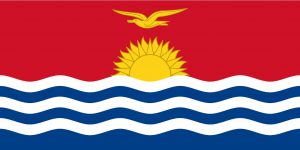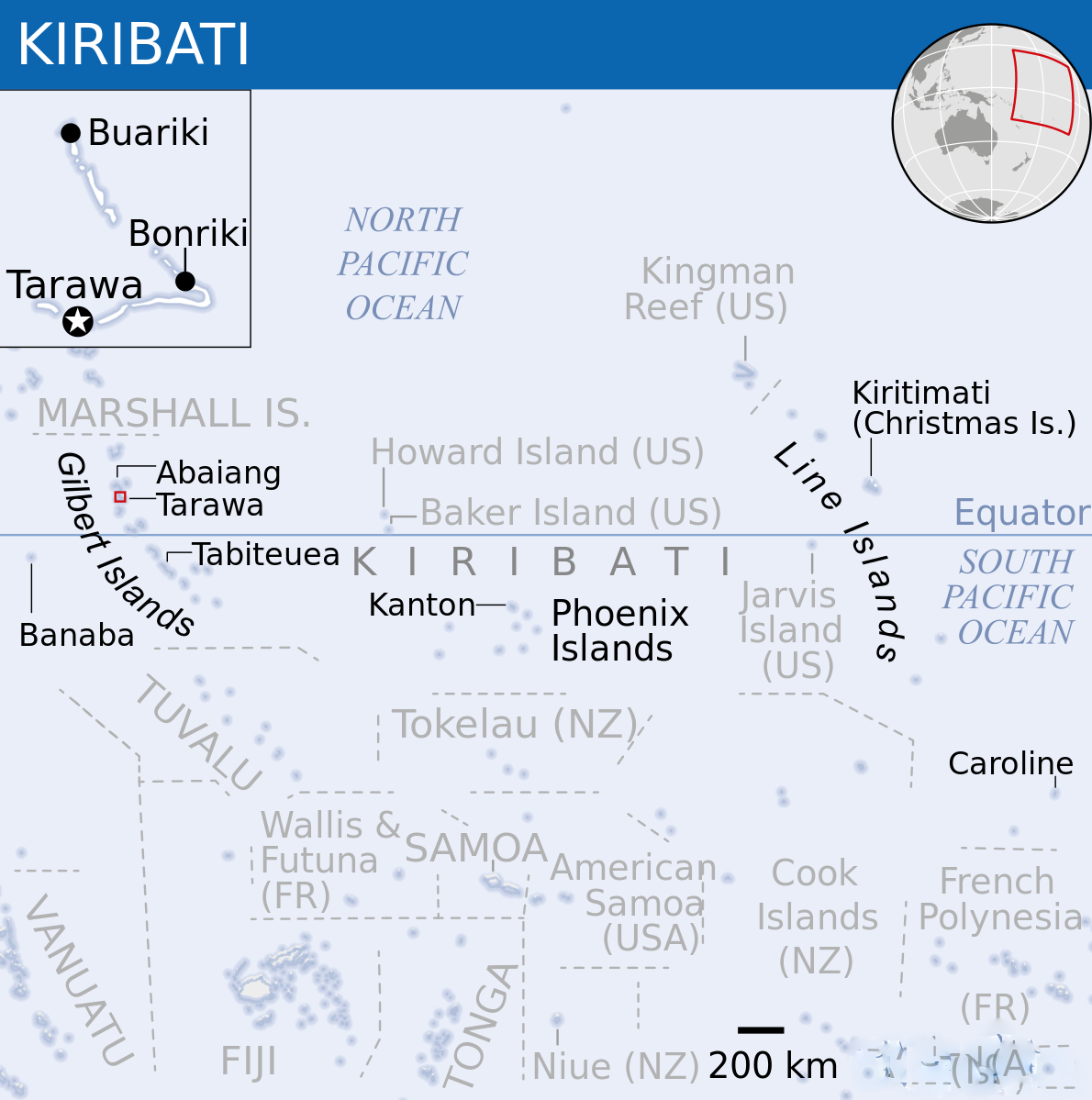
Kiribati
International Disaster Response Law in the Pacific
Overview

Legal Preparedness for International Assistance Assessment
1. Does Kiribati have a clear legal framework for disaster risk management which includes procedures relating to international disaster assistance?
As set out above, the legal framework is based upon the National Disaster Act (NDA) and the National Disaster Risk Management Plan (NDRMP). Although the NDA is silent on the issue of international disaster assistance the NDRMP provides a limited set of procedures for its use and request. These place responsibilities for requests with the National Emergency Operations Committee (NEOC) and the NDRMC. As the NEOC is a sub-committee of the NDRMC the distinction may be unimportant. Although it is not entirely clear from the plan, it appears that the NDRMC has the responsibility for such requests in “normal” operations but is not entirely clear why such requests would be needed in such cases.
Although the NDRMC (and the NEOC) has the responsibility for co-ordinating and providing advice on the need for external aid to the responsible Minister responsible (currently the Beretitenti), the plan is somewhat vague on where exactly this responsibility for requesting external aid lies. The NDRMP states that, “the Government will determine when a disaster situation exceeds national coping capacities and seek international and/or regional assistance to address the needs of affected communities”. It appears therefore that the request may be required to be a collective cabinet decision (although no legislation exists to this effect).
2. Do Kiribati’s laws and regulations clearly set out a focal point for coordinating international disaster assistance?
The National Disaster Risk Management Plan sets out that the National Emergency Operations Office will serve as the operational focal point for all major operations occurring within Kiribati, and will coordinate all response actions including the deployment of specialised humanitarian personnel and materials. However, at the time of writing, the Emergency Operations Office has not yet been established.
The NDRMP also requires that all relief supplies will be received by the National Disaster Risk Management Council, who will have overall control of supplies. In addition, the National Disaster Risk Management Council will determine the priority and quantities for distribution, and relief supplies that are brought into Kiribati will need to be stored in a weatherproof dry and secure area.
The Plan also provides the following functional responsibilities, of relevance to the coordination of incoming international relief, in the event of a disaster:
• The National Disaster Risk Management Council is to coordinate the disaster response, relief and recovery operations.
• The Disaster Controller is in control of all agencies and departments who are responding to assist in response, relief and recovery activities.
• The heads of individual agencies who are assisting in response, relief and recovery operations, are in command of their individual agencies or departments and under the control of the Disaster Controller.
None of these provide for an obvious single point of co-ordination in the absence of the planned NEOC.
3. Do Kiribati’s laws and regulations outline the roles and responsibilities of different institutions relating to international disaster assistance?
The Plan identifies the United Nations, international and local NGO’s including the Kiribati Red Cross Society and the IFRC Societies as key actors in disaster response.
It also specifies that the United Nations Office for the Coordination of Humanitarian Affairs coordinates the deployment of international specialised humanitarian personnel and materials to support government’s response efforts on the ground in close collaboration with the Kiribati NDMO, particularly in situations where local capacity is overwhelmed, in response to a new or escalating humanitarian crisis.
The NDRMP identifies that in order for successful international assistance, incoming support must be self-sufficient for the first 7-10 days of deployment (food and accommodation). Incoming support is required to operate under “a high level of local management and coordination”. In addition, “it must be made clear that the Kiribati government and the National Disaster Risk Management Council are in charge of the overall coordination and operations”.
In addition, the Plan labels specific types of agencies that should be contacted if there are large numbers of fatalities (e.g. agencies capable of assisting in the identification of victims).
4. Do Kiribati’s laws and regulations outline a process for requesting/welcoming offers of international disaster assistance, and for terminating international assistance?
As well as the information contained above, the NDRMP sets out that the National Disaster Risk Management Council must make the following considerations in advising the Government to request international assistance:
• Requests for relief supplies and resources should only be made if that particular requirement is not available or functioning within Kiribati.
• When making requests – carefully consider what is needed urgently and could be delivered by aircraft as opposed to not so urgent relief supplies that could be delivered by ship.
• Types and quantities of relief materials should be as accurate as possible and sufficient to maintain supply until normal supplies are resumed.
5. Do Kiribati’s laws and regulations provide for necessary legal facilities to be provided to international assisting actors?
The National Disaster Act 1989 sets out a number of specific legal immunities and responsibilities that apply to aid workers (both domestic and international). These include making any individual that obstructs a disaster worker, who discharging a responsibility in accordance with the National Disaster Plan, or in accordance with any regulations made under a state of public emergency, guilty of an offence.
In addition, immunity for liability applies to any “authorised volunteer worker of an agency” who is performing “a responsibility in accordance with the National Disaster Plan”. The only exception to this is where such loss or injury arises from “negligence or wilful misconduct.”
6. Do Kiribati’s laws and regulations set out quality standards for international assisting actors?
As mentioned above, the NDRMP sets out that all international assisting actors are to act under the coordination and control of the Kiribati Government and the National Disaster Risk Management Council.
Aside from this generic requirement there appear to be no specific quality standards for international assisting actors.
7. Do Kiribati’s laws and regulations set out eligibility requirements for international assisting actors to receive legal facilities?
There are no eligibility requirements for the limited special legal status that applies to assisting actors. The National Disaster Act creates the offence of “obstructing a disaster worker” and provides immunity for “a member officer or authorised volunteer worker” when performing responsibilities under the National Disaster Plan but no further definition is provided.
No other special legal facilities for international assisting actors appear to exist.
8. Do Kiribati’s laws and regulations establish a specialised unit for expediting the entry of international disaster assistance?
The Plan identifies the importance of an operational airport and port in order to receive international assistance, and lays out procedural guidelines on what to do if either of these facilities are not operational.
There do not appear to be any other regulations or legislation which provide for a specialist international disaster assistance.
9. Do Kiribati’s laws and regulations provide adequate transparency, safeguards and accountability mechanisms governing international disaster relief and initial recovery assistance?
The National Disaster Act provides a limited degree of safeguards around international disaster relief and requires that “all donations, in money or any other form, which are made, either from within Kiribati or overseas, to assist in recovery from disaster, or for other disaster related needs, shall be utilised for these purposes only; and not be diverted for any other purpose without the authority of the Cabinet; and the specific agreement of the donor persons, agency or country”. Beyond this requirement there are no obvious specific safeguards around international disaster management assistance.
10. Do Kiribati’s laws and regulations outline procedures for international disaster assistance sent from and transiting through Kiribati?
There appear to be no specific laws, regulations or other policies regarding international relief transiting through, or emanating from, Kiribati.
Laws, policies, plans and other resources
-
Joint Implementation Plan for Climate Change and Disaster Risk Management 2014-2023
-
National Disaster Risk Management Plan 2012
-
National Framework for Climate Change Adaption 2013
![]()

